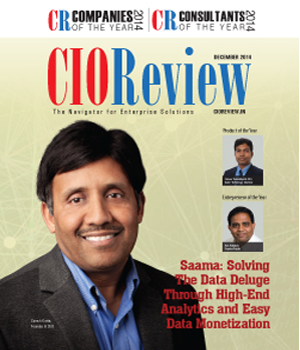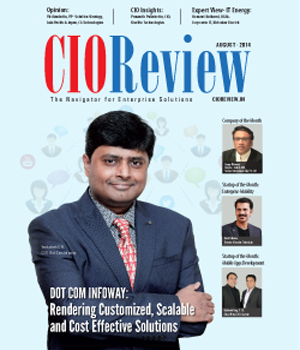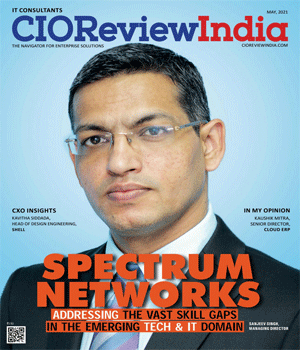
Top 5 Internet Anonymity Myths
CIOReview Team | Monday, 22 April 2019, 10:36 IST

Today we will talk about the most common myths related to Internet anonymity.
There is a well-established view that the Internet is a stronghold of freedom and anonymity and, using various tools or services, you can remain unnoticeable in the vast World Wide Web.
In fact, Internet anonymity is nothing more than a myth and no tool, plugin or service can guarantee you complete confidentiality, privacy, or security in the network.
Actually, the Internet is a very convenient tool for collecting and retrieving your data. The state intelligence services receive information from the Internet, banking and commercial structures are engaged in competitive intelligence there, advertising companies analyze and accumulate information about their users, private individuals are spying too after each other.
Search queries
Data collections begins at one of the first stages of using the Internet – when users enter keywords into the search fields. For example, in the Google search system, after you click on the any provided link that leads to the site of your interest, along with a search query for the selected resource, all data about your device and IP is sent too. That is, the system knows what you were looking for, what sites you visited, how long you were in this or that section of the site, and on which website your Internet session ended today.
Also, when you click on advertising links or banners, you leave your data with them too, including information about your interests. In addition, Google constantly monitors your behavioral attitudes and patterns, offering you (in the form of contextual advertising) the set of content that it deems necessary in this period of your surfing the Internet.
On the basis of all this data obtained, Internet giants like Google and Facebook form an Internet portrait (profile) of each user. After that, ubiquitous advertising begins to pursue you, offering you products or services based on your alleged needs.
Internet service providers
Do not forget about the ISP. The Internet service provider has information about your online activity too. It knows which sites you have visited, even if you visited them in incognito mode, by enabling this feature in the browser. Fortunately, the provider cannot read your mail, track passwords, or intercept downloaded or sent files.
But such actions possible for special tracking systems. We all remember the scandal in the United States when info on the already legendary PRISM system was published. PRISM conducted full monitoring of foreigners and US citizens. PRISM could intercept almost any information on the Internet and works directly with large companies that provided Internet services.
Data synchronization
For some reason, it is believed that if you do not disclose your real data, you can maintain complete confidentiality and no Google will know the real name, surname and other personal information. You create a meaningless e-mail address and specify the pseudonym that you just invented, assuming that you can go incognito now.
But your actions turn out to be useless when a friend enters your e-mail in his address book, indicating the real name and last name and synchronizing it, for example, with Google. This is where the ubiquitous search engine finds out what it needs, just by matching the address book and your email address.
Smartphones
Modern operating systems are considered fairly secure. However, even Apple devices suffer from viruses. Still, telephones are the best spying tools. Smartphones can collect information about the location of their owners by using GPS receivers built into most modern gadgets.Installed applications are asking the system about your mobile phone number, an IMEI, as well as a list of contacts, age, and gender. Of course, all these means of collecting information can be disabled in the settings of the device, but we do not always think about it and do not always turn them off.
Anonymous TOR Network
The most well-known and most effective method of anonymity is considered an anonymous Tor network.
The Onion Router is an extensive network of nodes or, more simply, a set of proxy servers and software for them.
When using this technology, user data passes through proxy servers independent of each other. Tor forms a special chain of nodes, through which encrypted data is transmitted. The chain changes periodically and new nodes are used. It is considered that it is very difficult to calculate the real address of the user and his data. There are a number of plug-ins that are embedded directly into browsers for using this technology, as well as separate Tor-based browsers with a different set of tools.
But here there is one big "But." Using Tor cannot guarantee you complete anonymity. It is due to the fact that the last of the nodes in the chain sees the traffic in unencrypted form. This is exactly what the attackers use to steal important data, such as passwords, logins, and other information. Even on its official website, Tor developers state that you should not count on complete confidentiality when using this network. In view of this, it is impossible to talk about complete anonymity using Tor networks. However, you can substantially increase your security if you start using VPN services. You can maximize your privacy with Tor over VPN. Current VPN offers and discounts can be found here.
CIO Viewpoint
With Managed Services Organizations Can Reduce...
By Krishnakumar Madhavan, Head IT & Innovation, KLA Software India Pvt Ltd
By Amandeep Singh, Vice President & Group Head - IT Infrastructure, Thomas Cook India Limited
By Brian Clarke, Solutions Architect-Networking and Collaboration, OneNeck IT Solutions
CXO Insights
Innovation in IT: Meeting Evolving Demands and...
By K Shivasankar, Vice President - Technology & Solutions, India, NTT DATA Inc
Low-Code/No-Code: The Key to Intelligent...
By Sachin Panicker, Chief AI Officer, Fulcrum Digital
Maximizing Business Insight with Big Data...















